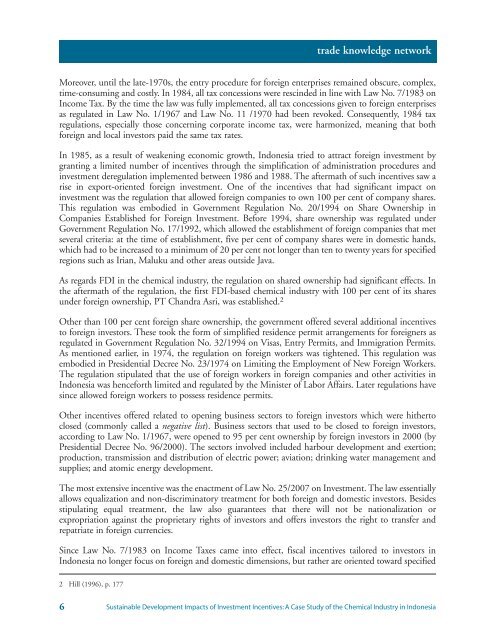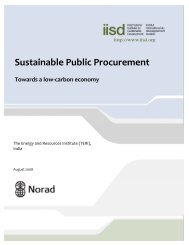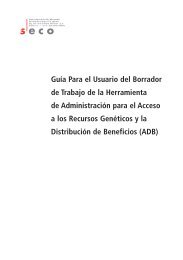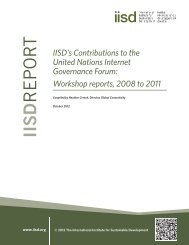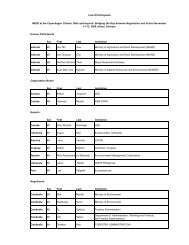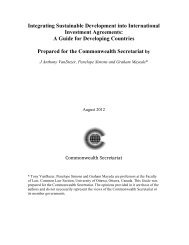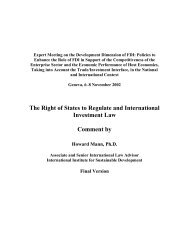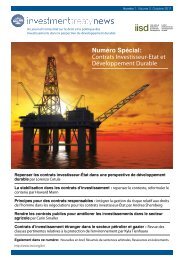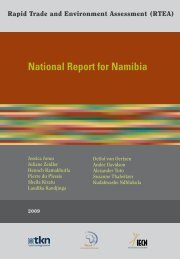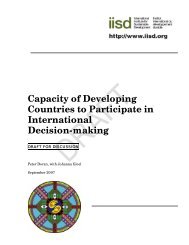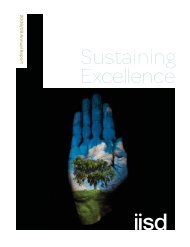Sustainable Development Impacts of Investment Incentives: A Case ...
Sustainable Development Impacts of Investment Incentives: A Case ...
Sustainable Development Impacts of Investment Incentives: A Case ...
You also want an ePaper? Increase the reach of your titles
YUMPU automatically turns print PDFs into web optimized ePapers that Google loves.
trade knowledge network<br />
Moreover, until the late-1970s, the entry procedure for foreign enterprises remained obscure, complex,<br />
time-consuming and costly. In 1984, all tax concessions were rescinded in line with Law No. 7/1983 on<br />
Income Tax. By the time the law was fully implemented, all tax concessions given to foreign enterprises<br />
as regulated in Law No. 1/1967 and Law No. 11 /1970 had been revoked. Consequently, 1984 tax<br />
regulations, especially those concerning corporate income tax, were harmonized, meaning that both<br />
foreign and local investors paid the same tax rates.<br />
In 1985, as a result <strong>of</strong> weakening economic growth, Indonesia tried to attract foreign investment by<br />
granting a limited number <strong>of</strong> incentives through the simplification <strong>of</strong> administration procedures and<br />
investment deregulation implemented between 1986 and 1988. The aftermath <strong>of</strong> such incentives saw a<br />
rise in export-oriented foreign investment. One <strong>of</strong> the incentives that had significant impact on<br />
investment was the regulation that allowed foreign companies to own 100 per cent <strong>of</strong> company shares.<br />
This regulation was embodied in Government Regulation No. 20/1994 on Share Ownership in<br />
Companies Established for Foreign <strong>Investment</strong>. Before 1994, share ownership was regulated under<br />
Government Regulation No. 17/1992, which allowed the establishment <strong>of</strong> foreign companies that met<br />
several criteria: at the time <strong>of</strong> establishment, five per cent <strong>of</strong> company shares were in domestic hands,<br />
which had to be increased to a minimum <strong>of</strong> 20 per cent not longer than ten to twenty years for specified<br />
regions such as Irian, Maluku and other areas outside Java.<br />
As regards FDI in the chemical industry, the regulation on shared ownership had significant effects. In<br />
the aftermath <strong>of</strong> the regulation, the first FDI-based chemical industry with 100 per cent <strong>of</strong> its shares<br />
under foreign ownership, PT Chandra Asri, was established. 2<br />
Other than 100 per cent foreign share ownership, the government <strong>of</strong>fered several additional incentives<br />
to foreign investors. These took the form <strong>of</strong> simplified residence permit arrangements for foreigners as<br />
regulated in Government Regulation No. 32/1994 on Visas, Entry Permits, and Immigration Permits.<br />
As mentioned earlier, in 1974, the regulation on foreign workers was tightened. This regulation was<br />
embodied in Presidential Decree No. 23/1974 on Limiting the Employment <strong>of</strong> New Foreign Workers.<br />
The regulation stipulated that the use <strong>of</strong> foreign workers in foreign companies and other activities in<br />
Indonesia was henceforth limited and regulated by the Minister <strong>of</strong> Labor Affairs. Later regulations have<br />
since allowed foreign workers to possess residence permits.<br />
Other incentives <strong>of</strong>fered related to opening business sectors to foreign investors which were hitherto<br />
closed (commonly called a negative list). Business sectors that used to be closed to foreign investors,<br />
according to Law No. 1/1967, were opened to 95 per cent ownership by foreign investors in 2000 (by<br />
Presidential Decree No. 96/2000). The sectors involved included harbour development and exertion;<br />
production, transmission and distribution <strong>of</strong> electric power; aviation; drinking water management and<br />
supplies; and atomic energy development.<br />
The most extensive incentive was the enactment <strong>of</strong> Law No. 25/2007 on <strong>Investment</strong>. The law essentially<br />
allows equalization and non-discriminatory treatment for both foreign and domestic investors. Besides<br />
stipulating equal treatment, the law also guarantees that there will not be nationalization or<br />
expropriation against the proprietary rights <strong>of</strong> investors and <strong>of</strong>fers investors the right to transfer and<br />
repatriate in foreign currencies.<br />
Since Law No. 7/1983 on Income Taxes came into effect, fiscal incentives tailored to investors in<br />
Indonesia no longer focus on foreign and domestic dimensions, but rather are oriented toward specified<br />
2 Hill (1996), p. 177<br />
6<br />
<strong>Sustainable</strong> <strong>Development</strong> <strong>Impacts</strong> <strong>of</strong> <strong>Investment</strong> <strong>Incentives</strong>: A <strong>Case</strong> Study <strong>of</strong> the Chemical Industry in Indonesia


